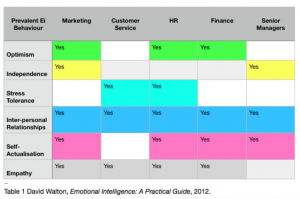According to Google and Harvard University there are 1,022,000 words in the English language. But according to Susan David, a well-known author and Professor of Psychology, we only use about 16,000 of them every day.
The emphasis today is on emotional agility and intelligence in the workplace. So using words in a smarter way will improve your social skills, which in turn will offer a wider range of career opportunities.
Focusing on how, why, when and where your emotions contribute to your behaviour and decision-making, or where they sabotage your thinking, will help in all areas of your life.
When you understand your feelings and emotions better, you’ll have a practical tool to target the personality traits you want to improve. Developing your strengths, will help you achieve the outcomes you value most.
Equally it will help reduce conflict in interpersonal relationships – with bosses, colleagues, family and friends. You’ll also be able to assert your own interests, while respecting those of others.
The best way to benchmark the current level of your emotional agility is to complete an EI Questionnaire. This instrument will provide you with a measure of the five key aspects of EI: self-awareness, emotion management, self-motivation, relationship management, and emotional coaching.
Knowing how you score in these areas will help you at work, where you have to deal with overt issues – strategy, policies, technology, authority and chains of command – as well as covert issues – that include attitudes, perceptions, culture and inter-group conflicts.
Knowing which pitfalls to avoid and which issues will give you a springboard to your goals is often as important as your ability to do the job.
Because of this EI is now in greater demand than innate intelligence.
Studies of 358 managers in 2000 and 2001 proved that Leadership Competencies amongst the emotionally intelligent were higher than those of average performers.
Moreover, women managers scored significantly higher on interpersonal skills and social responsibility then men. However, the latter were more adaptable.
The prominent Harvard Psychologist, David McClelland, studied 30 different organisations. The table below shows some of McClelland’s results for different occupations, and is quoted in Dr David Walton’s book Emotional Intelligence: A Practical Guide.
Back to Blog

